|
|
|
Sort Order |
|
|
|
Items / Page
|
|
|
|
|
|
|
| Srl | Item |
| 1 |
ID:
090145
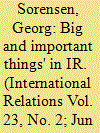

|
|
|
|
|
| Publication |
2009.
|
| Summary/Abstract |
Structural realism has important insights to offer regarding the current balance of power and its effects on world politics. But structural realism is less ready to analyze changes in statehood and their implications for international relations. States are not `like units' and anarchy does not always mean self-help. A richer concept of structure which includes economic power, political-military power, and international norms gives us a better take on the ways in which international forces affect domestic structures of states. In particular, they help us detect the weak states in the developing world, and the postmodern states in the OECD world. In weak states the classical security dilemma has been turned on its head: instead of domestic order and international threat there is domestic threat and international order. In postmodern states violent external threat has been dramatically reduced because these states make up a security community.
|
|
|
|
|
|
|
|
|
|
|
|
|
|
|
|
| 2 |
ID:
090149
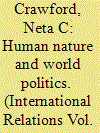

|
|
|
|
|
| Publication |
2009.
|
| Summary/Abstract |
While realists acknowledge that their theories of world politics are rooted in specific assumptions about human nature, neorealists tend to discount human nature in favor of an emphasis on systemic forces. Nevertheless neorealism has assumptions about human nature that shape neorealist theorizing. Specifically, in Man, the State, and War and Theory of International Politics, Waltz make essentially the same assumptions about human nature as the realists - that our human natures are fixed, that we cannot trust others, and that decision-makers are rational calculators who seek to promote their narrowly defined self-interests. Moreover, for Waltz, human nature determines world politics as much or more than its anarchic structure. A review of biology, specifically human neuroscience, suggests that these assumptions about human nature, and its relation to world politics, ought to be challenged. Our `natures' are much more complex and flexible than realism and neorealism assumes.
|
|
|
|
|
|
|
|
|
|
|
|
|
|
|
|
| 3 |
ID:
090146


|
|
|
|
|
| Publication |
2009.
|
| Summary/Abstract |
Kenneth Waltz opted to reject the rational actor assumption in developing his theory of international politics. That choice, I argue in this article, creates three problems for his theory. First, it means that it is unsuited for explaining state behavior, which means it is of limited utility for explaining the workings of the international system. Second, Waltz's claim that his theory is well suited to explaining international outcomes - as opposed to state behavior - is unconvincing. Those outcomes are heavily influenced by the actions of the great powers, but if his theory cannot predict their behavior, it is unlikely to reliably predict the outcomes of their behavior. Third, Waltz's assumption that states often behave recklessly leads to a more competitive world than described in his theory. I conclude with the suggestion that the theory's greatest virtue is its normative value - its ability to explain how the world should work, not how it works.
|
|
|
|
|
|
|
|
|
|
|
|
|
|
|
|
| 4 |
ID:
090147
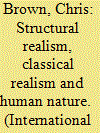

|
|
|
|
|
| Publication |
2009.
|
| Summary/Abstract |
Kenneth Waltz's Theory of International Politics is a modern classic, and deserves to be read the way classic texts ought to be read, i.e. in context and in its own terms. Recovering the context in this case is difficult because of the changes in the discourse since 1979, but one difference between the contemporary and the current reception of the text does seem clear - Waltzian structural realism (or neorealism) is now, but was not then, seen as breaking with the traditions of classical realism. How is this discontinuity to be understood? Part of the answer lies in the rhetoric employed by participants in this debate, but, more substantively, there is a genuine disagreement between neorealism and classical realism over the role played by human nature in international relations. Waltzian neorealism appears, contrary to the tradition, to reject any major role for human nature, describing theories that emphasise this notion as `reductionist'; however, on closer examination, the picture is less clear-cut. Waltz's account of human nature can be related quite closely to the major strands in the realist genealogy, but at a tangent to them. Interestingly, and perhaps unexpectedly, it is also compatible with at least some of the findings of contemporary evolutionary psychology.
|
|
|
|
|
|
|
|
|
|
|
|
|
|
|
|
| 5 |
ID:
090143
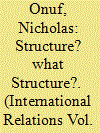

|
|
|
|
|
| Publication |
2009.
|
| Summary/Abstract |
Kenneth Waltz is a structural theorist. While scholars often comment on Waltz's conception of structure, they rarely address the philosophical assumptions behind it - assumptions that go back to Kant and finally to Aristotle. Appropriately situated, Waltz's conception of structure points to a strong version of constructivist social theory. To make my case, I trace Waltz's view of political structure in his early work, recapitulate his views on science, models and theory, address the question of his (or any) theory's relation to `reality', illustrate his difficulty with structural theory and institutional reality, and consider the vexed question of any theory's fit to a world already talked into existence. I show how close Waltz is to a philosophical position that solves his problem with theory's relation to reality and specifies the conditions under which any social theory can make sense or use of the term structure.
|
|
|
|
|
|
|
|
|
|
|
|
|
|
|
|
| 6 |
ID:
090144
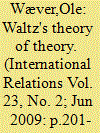

|
|
|
|
|
| Publication |
2009.
|
| Summary/Abstract |
Waltz's 1979 book, Theory of International Politics, is the most influential in the history of the discipline. It worked its effects to a large extent through raising the bar for what counted as theoretical work, in effect reshaping not only realism but rivals like liberalism and reflectivism. Yet, ironically, there has been little attention paid to Waltz's very explicit and original arguments about the nature of theory. This article explores and explicates Waltz's theory of theory. Central attention is paid to his definition of theory as `a picture, mentally formed' and to the radical anti-empiricism and anti-positivism of his position. Followers and critics alike have treated Waltzian neorealism as if it was at bottom a formal proposition about cause-effect relations. The extreme case of Waltz being so victorious in the discipline, and yet being so consistently misinterpreted on the question of theory, shows the power of a dominant philosophy of science in US IR, and thus the challenge facing any ambitious theorising. The article suggests a possible movement of fronts away from the `fourth debate' between rationalism and reflectivism towards one of theory against empiricism. To help this new agenda, the article introduces a key literature from the philosophy of science about the structure of theory, and particularly about the way even natural science uses theory very differently from the way IR's mainstream thinks it does - and much more like the way Waltz wants his theory to be used.
|
|
|
|
|
|
|
|
|
|
|
|
|
|
|
|
| 7 |
ID:
090150
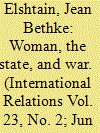

|
|
|
|
|
| Publication |
2009.
|
| Summary/Abstract |
Does `gender' as a category of analysis or as a central feature of a logic of explanation alter in significant ways Kenneth Waltz's famous `levels of analysis' as developed in his classic, Man, the State, and War? One overriding claim of feminist international relations has been that `gender' alters all levels of analysis; thus, changing `man' to `woman' in the formulation `man, the state, and war' significantly transforms our understanding of international relations. I evaluate this claim critically by assessing the adequacy of feminist formulations on each of Waltz's levels of analysis and, further, by unpacking Waltz's own understanding of these levels. I conclude that Waltz remains enormously helpful in deconstructing reductionist accounts, especially on the `first level' of analysis, but that his own account is problematic insofar as it insists on a `structural analysis' sundered from his levels 1 and 2, namely, wars flow from human nature or, alternatively, from the domestic ordering of states. I point out that Waltz himself leaves some `wiggle room' in his book that permits one to `plug in' features of the first two levels of analysis that are critical to understanding the structural level. In other words, all three levels must be in play if one is to craft a compelling explanatory framework.
|
|
|
|
|
|
|
|
|
|
|
|
|
|
|
|
|
|
|
|
|